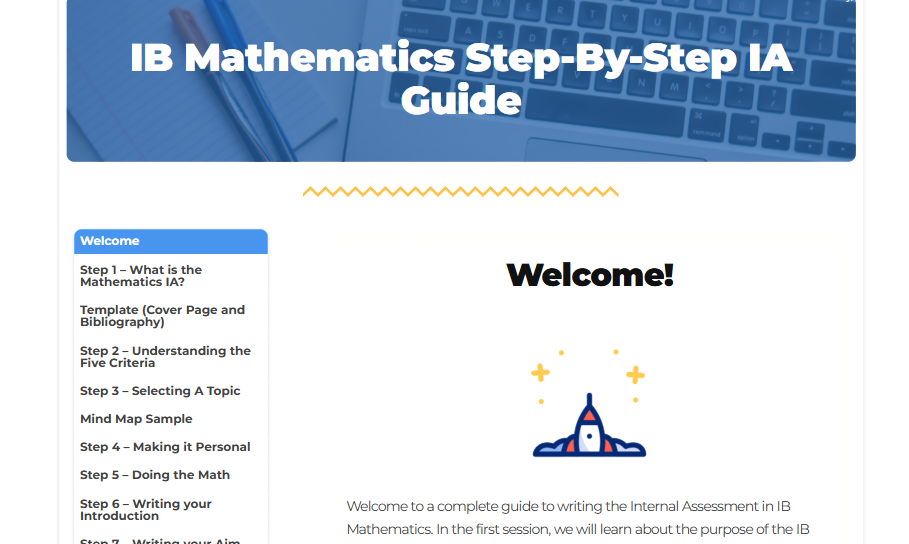Try Our Step-By-Step Math IA Guide For FREE
Embarking on your International Baccalaureate (IB) Mathematics Internal Assessment (IA) is far more than just a school assignment—it’s a golden opportunity to immerse yourself in the captivating realm of mathematics while exploring your own unique interests. This is your chance to take a deep dive into topics that resonate with your passions, whether that’s unraveling complex economic theories, delving into the laws of physics, studying ecological systems, or even uncovering the mathematical patterns behind music. Our Math IA topics are designed to showcase not only your analytical prowess but also your creativity and personal engagement, allowing you to construct a narrative that is as much about your intellectual journey as it is about mathematical discovery.
This process encourages you to ask thought-provoking questions, challenge existing ideas, and apply advanced mathematical concepts to real-world scenarios. By doing so, you develop a skill set that extends beyond the classroom, equipping you with the tools necessary for both academic and personal growth. To help you ignite your curiosity and guide your investigation, we’ve curated a list of 55 original Math IA topics that are carefully selected to inspire and challenge you. Each topic is crafted to serve as a starting point for a rich, engaging exploration that will not only deepen your understanding of mathematics but also allow you to express your individual interests and perspectives.
Explore Math IA topics
Explore Math IA topics

1–33: Classic Applications & Intriguing Mathematical Models
1. Modeling Traffic Flow Using Mathematical Equations
Discover how advanced mathematical models can simulate and optimize urban traffic patterns to alleviate congestion.
2. Logistic Functions in Population Growth Analysis
Examine how logistic functions model population dynamics, accounting for real-world environmental limitations.
3. Utilizing Benford’s Law for Fraud Detection
Investigate the unexpected digit distributions in data sets to reveal financial irregularities.
4. Statistical Analysis of Legal Case Outcomes
Analyze courtroom data to identify patterns and potential statistical misinterpretations that might affect legal judgments.
5. Mathematical Examination of Pyramid Schemes
Dissect exponential growth models behind pyramid schemes to understand the mathematics of their inevitable collapse.
6. Impact Prediction of Asteroid Collisions
Apply probability theory and impact modeling to assess the potential consequences of asteroid strikes on Earth.
7. Black Swan Events: Predicting Rare Financial Occurrences
Delve into mathematical frameworks designed to explain low-probability, high-impact events in financial markets.
8. Quantifying Happiness Through Utility Theory
Explore how economists use utility functions to mathematically model and measure happiness at both personal and societal levels.
9. Investigating Correlations Between Finger Length Ratios and Human Traits
Analyze statistical data to uncover significant relationships between digit ratios and various human characteristics.
10. Modeling Epidemic Spread with SIR Models
Use the Susceptible-Infected-Recovered (SIR) model to simulate and understand the dynamics of infectious disease outbreaks.
11. Exploring the Monty Hall Problem in Probability
Examine this famous probability puzzle to gain insights into conditional probability and strategic decision-making.
12. Monte Carlo Simulations in Risk Assessment
Utilize computational simulations to model risk and uncertainty across fields like finance and engineering.
13. Analyzing Lottery Systems: Probability and Expected Value
Investigate the mathematics behind lotteries by calculating probabilities and expected values to evaluate fairness.
14. Application of Bayes’ Theorem in Legal Contexts
Explore how Bayes’ Theorem refines probabilities with new evidence, particularly within legal scenarios.
15. Understanding the Birthday Paradox
Illustrate counterintuitive probability outcomes with the classic birthday paradox and its surprising statistical implications.
16. Evaluating the Simulation Hypothesis with Bayesian Statistics
Apply Bayesian reasoning to assess the possibility that our reality might be a sophisticated simulation.
17. Investigating the Impact of Managerial Changes on Sports Performance
Examine if and how managerial shifts affect team performance using detailed statistical analysis.
18. Identifying Difficult Multiplication Tables Among Students
Conduct a study to pinpoint which multiplication tables students find most challenging and explore the underlying reasons.
19. Introduction to Mathematical Modeling Techniques
Survey a variety of mathematical modeling methods and their applications to real-world scenarios.
20. Predicting Disease Spread with Infectious Disease Models
Employ mathematical models to forecast disease spread and evaluate the effectiveness of various control measures.
21. Cracking Codes with Chi-Squared Analysis in Cryptography
Use chi-squared tests to analyze letter frequency distributions and decipher classical cipher codes.
22. Simulating Zombie Outbreaks: Mathematical Approaches
Model fictional zombie outbreaks to draw intriguing parallels with real epidemic dynamics.
23. Modeling Musical Notes with Sine Waves
Investigate the relationships between sound frequencies and musical notes through the lens of sine wave functions.
24. Testing Extrasensory Perception with Binomial Distribution
Design experiments using binomial distribution to evaluate the statistical significance of ESP phenomena.
25. Measuring Reaction Times: Normal Distribution Analysis
Collect and analyze reaction time data to determine if they follow a normal distribution and explore influencing factors.
26. Exploring Projectile Motion and Its Envelope
Examine the trajectories of projectiles under various conditions to map the envelope that defines their possible paths.
27. Generalizing Projectile Motion to Elliptical Paths
Extend traditional projectile motion equations to scenarios where trajectories may curve into elliptical shapes.
28. Analyzing Projectile Motion with Variable Gravity
Explore how varying gravitational forces, such as on different planets, affect the motion and range of projectiles.
29. Investigating the Tusi Couple: Rolling Circles
Study the geometric phenomenon of one circle rolling inside another and its surprising applications in engineering and art.
30. Recreating Galileo’s Inclined Plane Experiments
Replicate and analyze Galileo’s classic experiments to explore motion, acceleration, and the underlying mathematical principles.
31. Applying the Logistic Function to Constrained Growth
Model situations where growth is limited by resources, space, or other factors using the logistic function.
32. Exploring Benford’s Law in Financial Data
Apply Benford’s Law to real-world financial datasets to detect anomalies and identify potential fraud.
33. Examining Statistical Errors in Legal Proceedings
Investigate how statistical misinterpretations have impacted legal outcomes and propose more robust analytical methods.
Explore Math IA topics

34–55: Innovative Twists & Contemporary Explorations in Math IA Topics
34. Applying Bayes’ Theorem in Medical Diagnostics
Shift the focus to healthcare by analyzing how diagnostic test results can refine disease probability assessments.
35. Mathematical Modeling Techniques in Ecology
Explore specialized mathematical models that simulate ecological systems and examine species interactions.
36. Analyzing the Mathematics of Fair Division
Examine algorithms that ensure equitable resource distribution, using concepts such as envy-free allocation.
37. Exploring the Mathematics Behind Chaos Theory
Dive into chaos theory to understand how minor variations in initial conditions can lead to drastically different outcomes.
38. Understanding the Mathematics of GPS Technology
Discover the intricate calculations that enable GPS systems to determine precise locations worldwide.
39. Mathematical Modeling of Traffic Signal Optimization
Investigate how optimizing traffic signal timings through mathematical models can improve urban traffic flow.
40. Exploring the Mathematics of Fair Games
Analyze the probabilities that ensure games are fair and develop strategies applicable in competitive scenarios.
41. Understanding the Mathematics of Internet Security
Examine cryptographic techniques and algorithms that protect digital communications and secure online data.
42. Modeling Climate Change with Mathematical Equations
Apply mathematical models to predict climate change patterns and assess the potential impact of environmental policies.
43. Exploring the Mathematics of Music Theory
Go beyond sine waves to explore how mathematics influences scales, chords, rhythm, and harmony in music.
44. Analyzing the Mathematics of Voting Systems
Evaluate various voting methods using mathematical principles to determine which systems best capture public opinion.
45. Investigating Non-Euclidean Geometries
Step outside traditional geometry by exploring hyperbolic and spherical geometries and their practical applications.
46. Understanding the Mathematics of Fractals
Study fractal geometry to reveal its intricate patterns in both natural phenomena and digital art.
47. Exploring the Mathematics of Financial Derivatives
Analyze the mathematical models behind financial derivatives and their role in modern financial markets.
48. Analyzing the Mathematics of Population Growth
Expand your exploration of population dynamics by examining different mathematical models beyond logistic functions.
49. Understanding the Mathematics of Image Compression
Delve into the algorithms that compress digital images effectively while preserving quality, focusing on the underlying math.
50. Exploring the Riemann Hypothesis
Tackle one of the most famous unsolved problems in mathematics and explore its implications for number theory and prime distribution.
51. Mathematical Modeling of Natural Disasters
Use differential equations and statistical methods to predict and understand natural disasters like earthquakes and tsunamis.
52. Understanding the Mathematics of Wireless Networks
Investigate the mathematical principles that optimize wireless communication systems for better performance and reliability.
53. Exploring Topology: The Study of Surfaces
Learn about topology by examining the properties of shapes and spaces that remain unchanged under continuous transformations.
54. Investigating the Mathematics of Genetic Algorithms
Examine how evolutionary principles are applied in algorithms to solve optimization problems in various fields.
55. Modeling Predator-Prey Relationships in Ecology
Apply mathematical models to simulate the dynamic interactions between predators and prey, revealing the stability of ecosystems.
Explore Math IA topics
Selecting the right Math IA topics is all about finding the perfect blend between your personal interests and the mathematical concepts you enjoy. This list of 55 unique ideas is designed to ignite your creativity, making your IA both an enjoyable research process and an impressive final presentation. Remember, the key to a successful IA is staying engaged, communicating your ideas clearly, and showcasing a deep understanding of the mathematics involved.
For more information about the Math IA go to https://www.ibo.org/
Happy exploring, and may your Math IA journey be as inspiring as it is insightful!
Math IA topics, Math ia ideas
Math IA topics, Math ia ideas
Math IA topics, Math ia ideas
Math ia topics, Math ia ideas





